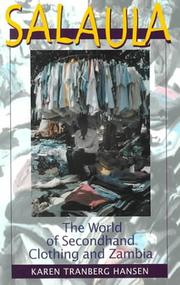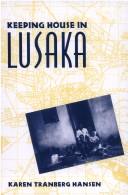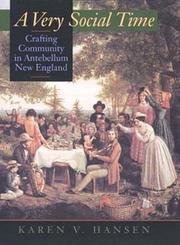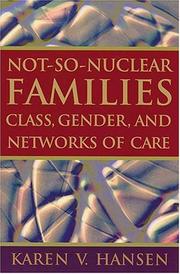| Listing 1 - 10 of 10 |
Sort by
|

ISBN: 0226315819 0226315800 Year: 2000 Publisher: Chicago (Ill.) : University of Chicago press,
Abstract | Keywords | Export | Availability | Bookmark
 Loading...
Loading...Choose an application
- Reference Manager
- EndNote
- RefWorks (Direct export to RefWorks)
#SBIB:39A4 --- #SBIB:39A73 --- Toegepaste antropologie --- Etnografie: Afrika --- Clothing and dress --- Clothing trade --- Fashion --- Material culture --- Used clothing industry --- Economic aspects --- Style in dress --- Apparel industry --- Clothiers --- Clothing industry --- Garment industry --- Rag trade --- Apparel --- Clothes --- Clothing --- Clothing and dress, Primitive --- Dress --- Dressing (Clothing) --- Garments --- Zambia --- Economic conditions. --- Social conditions. --- Secondhand trade --- Culture --- Folklore --- Technology --- Textile industry --- Tailors --- Beauty, Personal --- Manners and customs --- Undressing --- Fashion industry --- Vêtements et habillement --- Commerce des vêtements --- Culture matérielle --- Anthropologie culturelle --- Zambie --- Aspects économiques

ISBN: 0801495466 9781501719950 1501719955 9780801495465 0801422175 9780801422171 1501719963 1501727915 9781501727917 Year: 2018 Publisher: Cornell University Press
Abstract | Keywords | Export | Availability | Bookmark
 Loading...
Loading...Choose an application
- Reference Manager
- EndNote
- RefWorks (Direct export to RefWorks)
Distant Companions tells the fascinating story of the lives and times of domestic servants and their employers in Zambia from the beginning of white settlement during the colonial period until after independence. Emphasizing the interactive nature of relationships of domination, the book is useful for readers who seek to understand the dynamics of domestic service in a variety of settings. In order to examine the servant- employer relationship within the context of larger political and economic processes, Karen Tranberg Hansen employs an unusual combination of methods, including analysis of historical documents, travelogues, memoirs, literature, and life histories, as well as anthropological fieldwork, survey research, and participant observation.
Household employees --- Master and servant --- Sexual division of labor --- History --- Zambia --- Social conditions. --- Colonial influence. --- Division of labor by sex --- Division of labor --- Sex role --- Sex discrimination in employment --- Domestic employees --- Domestics --- Household staff --- Household workers --- Servants --- Employees --- Contracts --- Hire --- Law and legislation --- Sambia --- GRZ --- Government of the Republic of Zambia --- Republic of Zambia --- Zambië --- Republiek van Zambië --- Zambiya --- Замбія --- Zambii︠a︡ --- Рэспубліка Замбія --- Rėspublika Zambii︠a︡ --- Zambija --- Republika Zambija --- Замбия --- Република Замбия --- Republika Zambii︠a︡ --- Zambijská republika --- Gweriniaeth Zambia --- Republik Sambia --- Sambia Vabariik --- Ζάμπια --- Zampia --- Δημοκρατία της Ζάμπιας --- Dēmokratia tēs Zampias --- República de Zambia --- Zambio --- Zambia Respubliko --- Zambiako Errepublika --- République de Zambie --- An tSaimbia --- Poblacht na Saimbia --- Saimbia --- Yn Tambia --- Pobblaght ny Sambia --- Poblachd Shaimbia --- Tsan-pí-â --- Republica iti Zambia --- Republik Zambia --- Repubblica dello Zambia --- Republika ning Zambia --- Zambi --- Sambi --- Jamhuri ya Zambia --- Repubilika ya Zambia --- Zanbi --- Zambijas republika --- Zambijos Respublika --- Republiki ya Zambia --- Zambiai Köztársaság --- Замбија --- Bu̇gd Naĭramdakh Zambi Uls --- Tlācatlahtohcāyōtl Zambia --- ザンビア --- Zanbia --- Republikken Zambia --- Zambiya Respublikasi --- Republika Zambii --- República da Zâmbia --- Republica Zambia --- Республика Замбия --- Saambiya --- Sambian tasavalta --- Republiken Zambia --- Republika ng Zambia --- Zambiya Cumhuriyeti --- Saambi --- Republik bu Saambi --- 赞比亚 --- Zanbiya --- Northern Rhodesia --- Domestic service employees --- Domestic service workers --- Service employees, Domestic --- Service workers, Domestic --- Social & cultural anthropology

ISBN: 023108143X 0231081421 Year: 1997 Publisher: New York (N.Y.) : Columbia university press,
Abstract | Keywords | Export | Availability | Bookmark
 Loading...
Loading...Choose an application
- Reference Manager
- EndNote
- RefWorks (Direct export to RefWorks)
#SBIB:39A4 --- #SBIB:39A73 --- Toegepaste antropologie --- Etnografie: Afrika --- Public housing --- Urban anthropology --- Urbanization --- Women --- History --- Housing --- Cities and towns, Movement to --- Urban development --- Urban systems --- Cities and towns --- Social history --- Sociology, Rural --- Sociology, Urban --- Urban policy --- Rural-urban migration --- Anthropology, Urban --- Ethnology --- Government housing projects --- Housing policy --- Low-income housing --- Human females --- Wimmin --- Woman --- Womon --- Womyn --- Females --- Human beings --- Femininity --- Mtendere Township (Lusaka, Zambia) --- Mtendere Compound (Lusaka, Zambia) --- Economic conditions. --- Social life and customs. --- Social housing

ISBN: 0520084748 0520205618 0585249717 0520917952 9780520917958 9780585249711 Year: 1994 Publisher: Berkeley ; Los Angeles, California : University of California Press,
Abstract | Keywords | Export | Availability | Bookmark
 Loading...
Loading...Choose an application
- Reference Manager
- EndNote
- RefWorks (Direct export to RefWorks)
Karen Hansen's richly anecdotal narrative explores the textured community lives of New England's working women and men--both white and black--n the half century before the Civil War. Her use of diaries, letters, and autobiographies brings their voices to life, making this study an extraordinary combination of historical research and sociological interpretation. Hansen challenges conventional notions that women were largely relegated to a private realm and men to a public one. A third dimension--the social sphere--also existed and was a critical meeting ground for both genders. In the social worlds of love, livelihood, gossip, friendship, and mutual assistance, working people crossed ideological gender boundaries. The book's rare collection of original writings reinforces Hansen's arguments and also provides an intimate glimpse into antebellum New England life.
New England --- Social life and customs --- Women --- History --- 19th century --- NON-CLASSIFIABLE. --- New England. --- Human females --- Wimmin --- Woman --- Womon --- Womyn --- Females --- Human beings --- Femininity --- Social life and customs. --- Women. --- anecdotal. --- antebellum new england life. --- autobiographies. --- black and white. --- challenges conventional notions of gender roles. --- diaries. --- half century before civil war. --- historical research and sociological interpretation. --- letters. --- men and women. --- men to public realm. --- narrative of new englands working class. --- women to private realm.

ISBN: 081353500X 9780813535005 0813535018 9780813535012 081353741X 9780813537412 9780813557793 0813557798 1283526689 9781283526685 9786613839138 6613839132 Year: 2005 Publisher: Piscataway, New Jersey : Rutgers University Press,
Abstract | Keywords | Export | Availability | Bookmark
 Loading...
Loading...Choose an application
- Reference Manager
- EndNote
- RefWorks (Direct export to RefWorks)
In recent years U.S. public policy has focused on strengthening the nuclear family as a primary strategy for improving the lives of America's youth. It is often assumed that this normative type of family is an independent, self-sufficient unit adequate for raising children. But half of all households in the United States with young children have two employed parents. How do working parents provide care and mobilize the help that they need? In Not-So-Nuclear Families: Class, Gender, and Networks of Care, Karen V. Hansen investigates the lives of working parents and the informal networks they construct to help care for their children. She chronicles the conflicts, hardships, and triumphs of four families of various social classes. Each must navigate the ideology that mandates that parents, mothers in particular, rear their own children, in the face of an economic reality that requires that parents rely on the help of others. In vivid family stories, parents detail how they and their networks of friends, paid caregivers, and extended kin collectively close the "care gap" for their school-aged children. Hansen not only debunks the myth that families in the United States are independent, isolated, and self-reliant units, she breaks new theoretical ground by asserting that informal networks of care can potentially provide unique and valuable bonds that nuclear families cannot.
Sociology of the family. Sociology of sexuality --- Social welfare methods --- United States --- Social classes --- Social networks --- Families --- Family --- United States of America
Book
ISBN: 1009350331 1009350315 1009350358 1009350366 Year: 2023 Publisher: Cambridge : Cambridge University Press,
Abstract | Keywords | Export | Availability | Bookmark
 Loading...
Loading...Choose an application
- Reference Manager
- EndNote
- RefWorks (Direct export to RefWorks)
Drawing on half-a-century of research in Zambia and regional scholarship, Karen Tranberg Hansen offers a vibrant history of changing dress practices from the late-colonial period to the present day. Exploring how the dressed body serves as the point of contact between personal, local, and global experiences, she argues that dress is just as central to political power as it is to personal style. Questioning the idea that the West led fashion trends elsewhere, Hansen demonstrates how local dress conventions appropriated western dress influences as Zambian and shows how Zambia contributed to global fashions, such as the colourful Chitenge fabric that spread across colonial trading networks. Brought to life with colour illustrations and personal anecdotes, this book spotlights dress not only as an important medium through which Zambian identities are negotiated, but also as a key reflector and driver of history.
Clothing and dress --- Symbolic aspects. --- Symbolic aspects of clothing and dress --- Symbolism --- Cultural aspects --- Historical aspects --- Apparel --- Clothes --- Clothing --- Clothing and dress, Primitive --- Dress --- Dressing (Clothing) --- Garments --- Beauty, Personal --- Manners and customs --- Fashion --- Undressing --- Clothing and dress. --- Textiles. --- Fashion.
Book
ISBN: 0813549558 9786613383327 1283383322 0813550823 9780813550824 9781283383325 9780813549552 9780813549569 0813549566 Year: 2011 Publisher: New Brunswick, N.J. : Rutgers University Press,
Abstract | Keywords | Export | Availability | Bookmark
 Loading...
Loading...Choose an application
- Reference Manager
- EndNote
- RefWorks (Direct export to RefWorks)
At the Heart of Work and Family presents original research on work and family by scholars who engage and build on the conceptual framework developed by well-known sociologist Arlie Russell Hochschild. These concepts, such as "the second shift," "the economy of gratitude," "emotion work," "feeling rules," "gender strategies," and "the time bind," are basic to sociology and have shaped both popular discussions and academic study. The common thread in these essays covering the gender division of housework, childcare networks, families in the global economy, and children of consumers is the incorporation of emotion, feelings, and meaning into the study of working families. These examinations, like Hochschild's own work, connect micro-level interaction to larger social and economic forces and illustrate the continued relevance of linking economic relations to emotional ones for understanding contemporary work-family life.
Hochschild, Arlie Russell, 1940- -- Criticism and interpretation. --- Work and family. --- Work and family --- Business & Economics --- Labor & Workers' Economics --- Hochschild, Arlie Russell, --- Criticism and interpretation. --- Families and work --- Family and work --- Families --- Dual-career families --- Work-life balance --- E-books --- Hochschild, Arlie Russell --- Sociology of the family. Sociology of sexuality --- Sociology of work
Book
ISBN: 9786611765620 1281765627 0253000254 9780253000255 661176562X 9781281765628 9780253351098 025335109X 9780253219695 0253219698 Year: 2008 Publisher: Bloomington : Indiana University Press,
Abstract | Keywords | Export | Availability | Bookmark
 Loading...
Loading...Choose an application
- Reference Manager
- EndNote
- RefWorks (Direct export to RefWorks)
Innovative new research on globalization's impact on urban youth
Urban youth --- City dwellers --- Youth --- City children --- #SBIB:316.7C131 --- #SBIB:39A4 --- Cultuursociologie: jeugdcultuur --- Toegepaste antropologie --- Jeunes en milieu urbain
Book
ISSN: 1360466X ISBN: 0857858203 9780857858207 9780857854186 0857854186 9780857853806 0857853805 9780857853813 0857853813 9781306846271 1306846277 9781474280068 1474280064 Year: 2013 Publisher: London : Bloomsbury,
Abstract | Keywords | Export | Availability | Bookmark
 Loading...
Loading...Choose an application
- Reference Manager
- EndNote
- RefWorks (Direct export to RefWorks)
Dress and fashion practices in Africa and the diaspora are dynamic and diverse, whether on the street or on the fashion runway. Focusing on the dressed body as a performance site, African Dress explores how ideas and practices of dress contest or legitimize existing power structures through expressions of individual identity and the cultural and political order. Drawing on innovative, interdisciplinary research by established and up and coming scholars, the book examines real life projects and social transformations that are deeply political, revolving around individual and public goals of dig
Clothing and dress --- Fashion --- fashion [culture-related concept] --- costume [mode of fashion] --- kleding --- Africa
Book
ISBN: 1934854190 0913113425 Year: 2008 Publisher: [Place of publication not identified] Mary Ann Liebert Incorporated
Abstract | Keywords | Export | Availability | Bookmark
 Loading...
Loading...Choose an application
- Reference Manager
- EndNote
- RefWorks (Direct export to RefWorks)
| Listing 1 - 10 of 10 |
Sort by
|

 Search
Search Feedback
Feedback About UniCat
About UniCat  Help
Help News
News